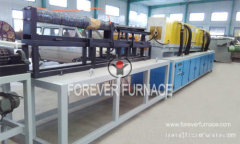
Induction forging furnace-induction forging furnace factory
| Min. Order: | 1 Set/Sets |
|---|---|
| Trade Term: | FOB,CFR,DAT,DDP,EXW |
| Payment Terms: | L/C, D/A, T/T, WU |
| Supply Ability: | 100 sets per year |
| Place of Origin: | Hebei |
Company Profile
| Location: | Cangzhou, Hebei, China (Mainland) |
|---|---|
| Business Type: | Manufacturer |
| Main Products: | Bars & Tubes Hardening And Tempering, Induction Bar & Tubes Heater, Induction Heating In Hot Rolling Mills, Billet Reheatin |
Product Detail
| Model No.: | HY116 |
|---|---|
| Means of Transport: | Ocean |
| Brand Name: | FOREVER |
| APPLICATION: | Material heat treatment |
| Heating method: | Induction |
| Customized: | yes |
| Service: | Free installing and debugging |
| Production Capacity: | 100 sets per year |
| Packing: | As per customer's requirement |
| Delivery Date: | 10-15 days after your down payment |
Product Description
Forging and Hot Forming
Metal forging and hot forming are excellent induction heating applications. Industrial forging and hot forming processes involve bending or shaping a metal billet or bloom after it has been heated to a temperature at which its resistance to deformation is weak. Blocks of non-ferrous materials can also be used.
Induction forging furnace or conventional furnaces are used for the initial heating process. Billets can be transported through the inductor via a pneumatic or hydraulic pusher; pinch roller drive; tractor drive; or walking beam. Non-contact pyrometers are used to measure the billet temperature.
Other machines such as mechanical impact presses, bending machines, and hydraulic extrusion presses are used to bend or shape the metal.
The approximate hot forming temperatures of the most commonly used industrial materials are:
• Steel 1200º C • Brass 750º C • Aluminium 550º C
Total Forming Applications
Induction forging furnace is commonly used to heat steel billets, bars, brass blocks, and titanium blocks to the proper temperature for forging and hot forming.
Partial Forming Applications
Induction heating is also used to heat parts such as pipe ends, axle ends, automotive parts, and bar ends for partial forming and forging processes.
The Induction Heating Advantage
When compared to conventional furnaces, induction heating machines for forging offer significant process and quality advantages:
Much shorter heating times, minimizing scaling and oxidation
Easy and accurate temperature temperature control. Parts at temperatures outside specifications can be detected and removed
No time lost waiting for the furnace to ramp up to the required temperature
Automated induction heating machines require minimal manual labor
Heat can be directed to one specific point, which is highly important for parts with only one forming area.
Greater thermal efficiency - heat is generated in the part itself and does not need to be heated in a large chamber.
Better working conditions. The only heat present in the air is that of the parts themselves. The working conditions are much more pleasant than with a fuel furnace.
Contact person:Tom Wang
What'sapp:+86 13303078975

